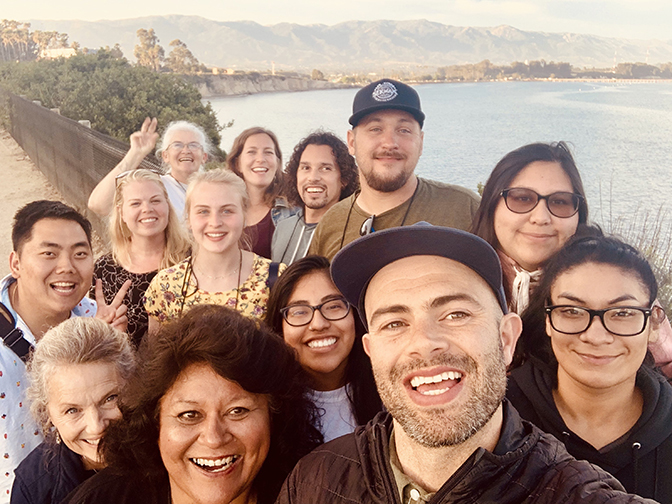Faculty Focus
Meet Danny Lynch, new Promise counselor at Cañada College
Interview conducted by Katharine Harer, AFT 1493 Co-Vice President & Outreach Organizer

Danny Lynch (front) with his Cuesta College students at the UCSB EOPS Summer Institute
Tell us about some of the work you’ve done before coming to our district?
It was quite a circuitous journey before landing in the SMCCD. After undergrad I was pretty lost in terms of what to do with my life and tried a lot of paths. During this time, I worked in the service industry, surf shops, drove town cars to the airport, and was part of a non-profit that sold coffee at the farmers market to support environmental and social justice projects in Nicaragua. I eventually went to South America for a year and taught English with the United Nations Development Program. In the end, it was this experience that made it clear to me that I wanted a career that would allow me to serve others. At first, I thought I would do this through medicine. After being back at community college for a couple years doing prerequisites for PA [physician’s assistant] school, I found myself guiding my fellow students and helping them with resources. Being a community college and transfer student myself, I found that my story and the tools I picked up along the way were very helpful when applied to helping other students reach their goals. I enjoyed working in free clinics and saw a lot of potential to help communities through preventive medicine, but I knew working at a community college was what I really wanted to do deep down.
In graduate school I was involved in gender-based violence education and prevention, advising and providing accommodations at the DRC, Career Counseling and working as a counseling intern at Alan Hancock Community College. Upon graduation I got a part-time counseling position at Cuesta college. I was there for 5 years and worked as a counselor in EOPS, Pre-Health/Nursing and the Dream Center. I was really happy at Cuesta working as a part-time counselor but I also had a long-term goal of eventually joining this district. I am very happy and grateful to be here!
What drew you to becoming a community college counselor?
I touched on it a little bit in the first question but my own experience as a community college student drew me to becoming a community college counselor. I wasn’t able to fully participate and take advantage of high school because of life circumstances and community college gave me another opportunity at education. It provided me a path to a college degree as well as graduate school. I experienced first-hand how transformative community can be, and this really drew me in and made me want to be part of the family.
| “I do see it as one of the greatest, equitable systems and tools we have to make immense changes in the lives of individuals from all backgrounds. There is a lot of work to still do, but it’s a pretty magical place. It provides so much opportunity to work for social justice and make a long-lasting impact.” |
Of course, it’s not perfect and many barriers still exist in the institution, but at the heart of it, I do see it as one of the greatest, equitable systems and tools we have to make immense changes in the lives of individuals from all backgrounds. There is a lot of work to still do, but it’s a pretty magical place. It provides so much opportunity to work for social justice and make a long-lasting impact
I also love believing in people, encouraging and being there for them and most of all, connecting them with the resources they need to get to where they want to go. Being a community college counselor lets me do all these things and have the privilege to be part of someone’s journey and story. It’s special and I never take it for granted. I have the best job in the world.
From talking to you, I could tell you have an understanding of “non-traditional” students. How did you learn this?
My own my path and sensitivity have led me to be curious about the stories of others. When you are curious about others and seek to understand their lives and how they experience — or move through — this world, you see quickly that we don’t live in a meritocracy. You see massive social stratification that creates all kinds of barriers and inequities. This awareness, among other personal experiences, helps me understand many of my students and the path they’re on. That doesn’t mean I know how it feels to be them, but it gives me an understanding of their world, which allows me to serve them.
What do you like the best about your job as a Promise Counselor at Cañada?
I have only been here for a semester but my answer will be the same 4 years from now: working with my students. They’re the real MVPs. They inspire and energize me so, so much. I know you shouldn’t depend on others for your happiness, but my students, and watching them on their journeys, make me genuinely happy.
I also have really been enjoying meeting the staff and faculty here. I am looking forward to building more relationships and connections. It is really important for me to create a family wherever I am, so hopefully we can do that.
What do you find frustrating or challenging about your job?
If I am being truly transparent, it would be that so many classes are online. By no means am I suggesting we shouldn’t have online classes or a hybrid work policy. With that said, the pendulum has swung too far towards online modalities and this is a challenge when I am trying to find in-person courses for students. Many of my students are coming back after a semester of only-online and wanting only in-person classes and there are very few options. They are really disappointed when I have nothing to offer them, and it’s frustrating as a counselor not being able to help provide your student with what they need to be successful. Not only have students expressed learning better in-person, but they are really missing that social aspect. They want to engage with their peers. They want to make friends and connect with their professors and counselors. They want to have a college experience, and when the majority of classes are online, we are depriving many students from this. I am not trying to take anyone’s hybrid schedule away or demand we be in person 100 percent. We really need to look at how we are interpreting the data and be honest with ourselves in terms of why we want to be online and why we’re advocating to work from home.
Can you share one or two anecdotes about recent students? (without names or identifying info, of course!)
Sure, a really easy one would be a STEM student I have who was failing all of his classes after the first seven weeks of the semester. They were having a lot of trouble getting motivated, managing time and overall having trouble adjusting to the demands of college. I worked really closely with this student throughout the semester addressing the above issues, but most of all letting them know I would always be there to support them as long as they showed up. I was also able to do several warm handoffs with them. I brought them up to the Learning/STEM center and introduced them to the people there. I also introduced them to one of our amazing retention specialists, Gonzalo, who was super helpful. It wasn’t an immediate change, but over the semester they started spending more and more time in the Learning Center and developing their study skills. Yesterday they just dropped by to check-in and make sure they were good to go for next semester. I asked if they were passing all of their classes and they said yes — and to that I said, “Yeah, you are good to go and you’ll be able to move on to the next courses in the sequence that we have in your plan.” This is quite a common story, but I tell it because it shows the importance of showing up for the student beyond the Student Educational Plan.
When you’re not working, how do you like to spend your free time?
Dabbling in art projects, surfing, exploring nature, eating and eating again, walking through cities, trying to listen more and just trying to be a less selfish human — but it’s hard!

Danny catching a wave
Anything else you’d like to add?
If you read this, thank you for being interested in me. I would like to learn about you. If you want to connect with me, I would love to collaborate, be mentored/learn from you, or just meet a new friend. I guess, lastly, I am genuinely honored to have this opportunity to work as a counselor. I consider it a privilege and I absolutely love it.
